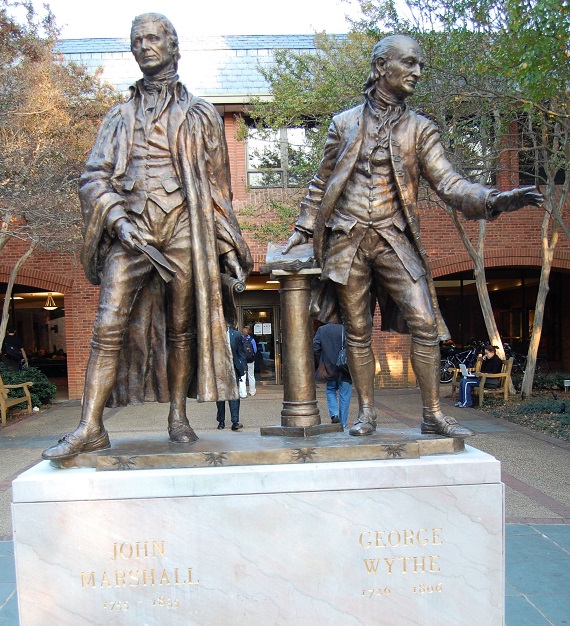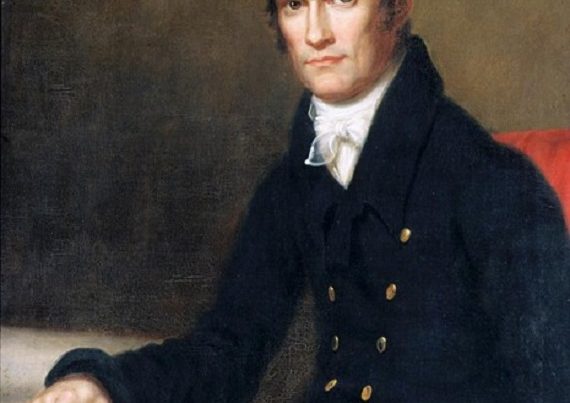
During the weekend of 15 to 16 February, I had the great honor to represent my law school at the 48th Annual Spong Moot Court Tournament hosted by William & Mary’s Marshall-Wythe School of Law. My team did not fair too well, but I was treated to the wonderful hospitality of the law school’s library team when I inquired about George Wythe. The library staff takes great pride in the lineage of the law school, and they are especially proud and eager to share all they can about Wythe. As recompense for such wonderful hospitality, I am passing along my experience through the Abbeville Institute because I know that the kind scholars here will be happy to hear that such a place exists.
First, a couple of notes about who Wythe was. He was the first law professor at William & Mary, having been appointed in 1779 to the newly created Professor of Law and Police chair. His legal instruction included pupils such as John Marshall (one wonders what went wrong), St. George Tucker (who would succeed him as professor of law at William & Mary), and, Wythe’s favorite student, Thomas Jefferson.
Wythe’s legal career spanned many of the most important decades in the history of Virginia and of the United States. He served in the state’s legislature, briefly as the Attorney General when Virginia was still a colony of Great Britain, and as the lone chancellor on the High Court of Chancery. He was also a signer of the Declaration of Independence, authored by his student Thomas Jefferson. Given all of this, it should be little wonder why he is held in such high regard by William & Mary; however, it should give one pause to think that very few in the legal profession of the United States could probably explain mere surface details of his contribution to the area of the law. Enter the law library staff at the Marshall-Wythe School of Law.
Known as the Wolf Law Library, it features one of the best historical exhibits in the United States: an exact replica of Wythe’s library. Three of the books were actually owned by Wythe, while the rest are editions that would have been the same as the ones he owned. Books on topics ranging from poetry, mathematics, law, and the Bible are shelved in this little room. Among the books is a first edition of St. George Tucker’s “American Edition” of Blackstone’s Commentaries.
The Wolf Law Library staff have a pretty good idea of the titles Wythe had because of the list created by Jefferson when he received the books. In fact, most of the actual Wythe-owned books are at the Library of Congress because of Jefferson having handed them down as a means of creating an intellectual foundation on which the republic could stand. Other Wythe books are actually held by the William & Mary school library; in fact, the books on display by the Wolf Law Library are on loan from the university library.
Beyond the physical replica library, the Wolf Law Library hosts “Wythepedia,” an online encyclopedia dedicated to the legal work of Wythe. From this website, one can research court decisions authored by Wythe, his personal letters and papers, and even see digital scans of the books that are on display in the replica library. The court decisions are arranged by decisions that Wythe organized in what is known as Wythe’s Reports, and the remaining bulk of the cases can be found in early editions of the Virginia Reports. “Wythepedia” provides a brief synopsis of the case and the decision, along with, in many cases, a scanned version of the case as it would appear in either of the Reports. This excellent resource puts the decisions of Wythe just a click away from any aspiring lawyer. The letters section also provides electronic versions of the handwritten letters to John and Samuel Adams, Benjamin Franklin, James Madison, George Mason, and Thomas Jefferson, just to name a few.
“Wythepedia” is an example of dedicated people striving to ensure that the contributions made by South to the early republic are kept alive. George Wythe belongs in the list of names that make up the role of “Great Founders” because, without his teachings and influence, there would be no Jefferson or Tucker. Thanks to the efforts of the Marshall-Wythe School of Law and the staff at the Wolf Law Library, the preservation of Wythe’s legal legacy continues. This is certainly an example of preserving “what is true and valuable about the Southern Tradition” as well as the American legal tradition.






